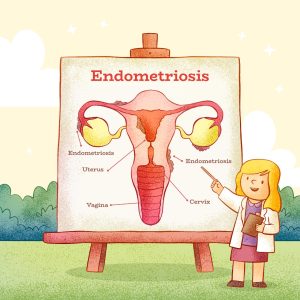Endometriosis and thyroid disorders are prevalent health conditions that affect women globally. Endometriosis occurs when tissue resembling the uterine lining grows outside the uterus, while thyroid issues like hypothyroidism and hyperthyroidism can disrupt metabolism and energy levels. Both conditions can have a profound impact on a woman’s health, and diet plays a vital role in alleviating symptoms and enhancing overall well-being. This article outlines an effective Indian diet plan designed to manage both endometriosis and thyroid disorders, emphasizing anti-inflammatory as well as nutrient-rich foods. Endometriosis and Thyroid Diet Plan ( Indian Menu )
Endometriosis and Thyroid Disorders
Endometriosis and thyroid disorders involve severe hormonal imbalances. A balanced, nutrient-rich diet works to correct these ailments.
Endometriosis: This occurs when endometrial-like tissue grows outside the uterus, leading to severe pain, heavy periods, and infertility.
Thyroid disorder: These result from an imbalance in thyroid hormones. Hypothyroidism, where the thyroid produces too little hormone, can lead to fatigue, weight gain, and depression. In contrast, in hyperthyroidism, there is an excess of thyroid hormone that can cause weight loss, anxiety, and fatigue.
Diet Tips for Managing Endometriosis and Thyroid Health
Endometriosis and thyroid combination can lead to severe inflammation. Including anti-inflammatory foods in your diet can help manage pain, reduce swelling, and improve overall health. This Anti-inflammatory food list will come in handy.
Iodine is essential for thyroid health, and ensuring adequate intake can help manage hypothyroidism. However, too much iodine can be problematic, especially for those with hyperthyroidism. Iodized salt intake is beneficial in hypothyroidism.
Omega-3 fatty acids help reduce inflammation and can play a role in managing both endometriosis and thyroid disorders. These healthy fats also support hormone production and overall wellness.
Fiber is beneficial for thyroid function and digestion. It helps regulate hormones, particularly estrogen, which plays a role in both conditions.
Foods rich in antioxidants, like vitamins A, C, and E, help reduce oxidative stress. this oxidative stress can worsen endometriosis symptoms and thyroid dysfunction.
Endometriosis and Thyroid Diet Plan ( Indian Menu )
Early morning: 6 soaked almonds and 2 soaked walnuts + 1 glass of cinnamon water
Breakfast: Mung dal chilla with grated carrot and spinach OR Vegetable Upma with Ground Flaxseeds OR Oats Porridge with Walnuts and Chia Seeds.
Mid-Morning Snack: 1cup green tea + papaya / pomegranate
Lunch: Quinoa Pulao with Mixed Vegetables and Cottage Cheese (Paneer) OR Brown Rice with Turmeric Lentils (Dal) and Spinach + Kacha Papaya Salad with Lemon and Olive Oil.
NOTE- (Papaya is rich in digestive enzymes and antioxidants. It can help improve digestion and reduce inflammation in the body, especially in cases of endometriosis.)
Afternoon Snack: Cucumber and Carrot Sticks with Hummus OR Coconut Water and a Few Cashews
Dinner: Methi (Fenugreek) Paratha with Yogurt OR Baked Salmon OR Grilled Chicken with Steamed Broccoli OR Masoor Dal Soup with a Side of Whole Wheat Roti
Diet Tips for Endometriosis and Thyroid Disorders
- Incorporate Anti-inflammatory Herbs
Use turmeric, ginger, and garlic in your cooking. These herbs have potent anti-inflammatory properties and can help manage both endometriosis and thyroid issues.
Minimize the consumption of processed and refined foods, as they can increase inflammation and worsen symptoms. Focus on whole foods like fruits, vegetables, legumes, and whole grains.
Probiotics help support gut health, which plays a role in hormone regulation. Include fermented foods like yogurt, kefir, and kimchi in your diet.
For those with thyroid disorders, especially hypothyroidism, it’s essential to consume an adequate but not excessive amount of iodine. Include iodine-rich foods like seaweed in moderation.
Proper hydration is essential for overall health and hormone balance. Drink plenty of water, herbal teas, and coconut water throughout the day.
Does a gluten-free diet help in endometriosis and thyroid disorders?
It is important to note that there is not much scientific evidence that a gluten-free diet helps with these disorders. However, a gluten-free diet may be helpful for people with endometriosis and thyroid disorders, particularly if they have gluten sensitivity or autoimmune components (e.g., celiac disease or Hashimoto’s thyroiditis). One must understand that it is not a guaranteed treatment for these conditions, and its effectiveness can vary from person to person. If you suspect gluten may be affecting your health, it’s important to speak with a healthcare provider to determine the best approach for managing your condition.
A gluten-free diet can help decrease inflammation, help in resetting your gut as well as improve immunity.
End Note
Endometriosis and Thyroid Diet Plan ( Indian Menu ) is focused on anti-inflammatory, nutrient-dense foods that can play an important role in managing endometriosis and thyroid disorders. By prioritizing omega-3 fatty acids, fiber, antioxidants, and anti-inflammatory foods, individuals can help regulate hormones, reduce symptoms, and improve their quality of life. Always consult with a healthcare professional or nutritionist for a personalized plan tailored to your specific health needs. For a personalized diet plan on endometriosis, you can email us at care@dietburrp.com




